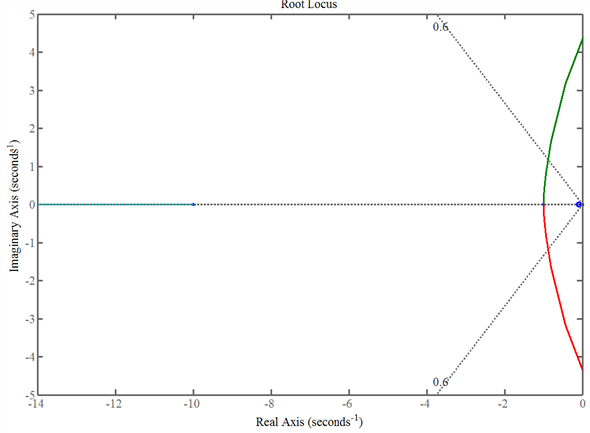The poles on the root locus plot are denoted by x and the zeros are denoted by o.
Root locus plot matlab.
Both of the two feedback systems shown in figure 11 49are covered by this command.
A root locus plot for this system is shown below along with the matlab used to create it.
We can use matlab and its control system toolbox to plot the root locus of a control system given its characteristic equation or its forward transfer function.
After running in the command window go to the root locus plot and select a point near those indicated by the cross marks on the plot below.
A graphical method that uses a special protractor called a spirule was once used to determine angles and draw the root loci.
The root locus plots the poles of the closed loop transfer function in the complex s plane as a function of a gain parameter see pole zero plot.
Root locus design is a common control system design technique in which you edit the compensator gain poles and zeros in the root locus diagram.
This kind of plot is sufficiently important that matlab has a command specifically for generating these plots.
Rlocus adaptively selects a set of positive gains k to produce a smooth plot.
The root locus of an open loop transfer function is a plot of the locations locus of all possible closed loop poles with some parameter often a proportional gain varied between 0 and.
Add the code k poles rlocfind c g1 onto the end of your m file to help you choose a specific loop gain.
It shows the path of the roots as k is varied but does not show the actual values of k.
Of course matlab can do this more accurately but it is important to know how pole and zero locations affect the final plot.
11 7 2 using matlab to plot the root locus the matlab command rlocus sys which belongs to the control system toolbox facilitates plotting the root locus trajectories for an open loop transfer function previously defined as sys and the variable feedback gain k.
The root locus plot depicts the trajectories of closed loop poles when the feedback gain k varies from 0 to infinity.
There is a method to do this with the rlocfind command in matlab.
As the open loop gain k of a control system varies over a continuous range of values the root locus diagram shows the trajectories of the closed loop poles of the feedback system.
Rlocusgui is a graphical user interface written in the matlab programming language.
Thus we are limited to those responses that exist along the root locus.
1 as a first example consider the system which characteristic equation is as follows.

